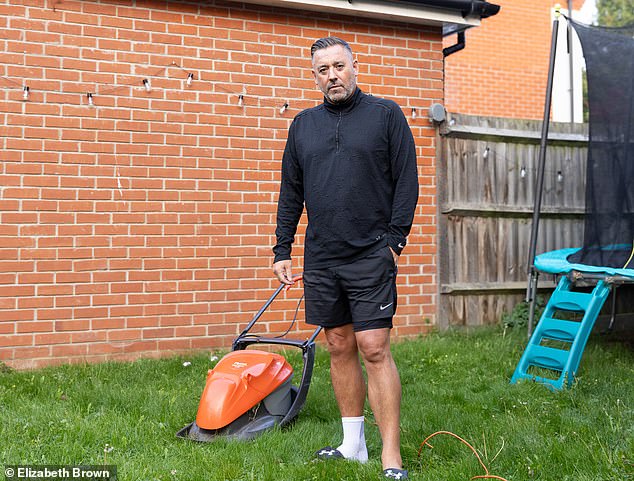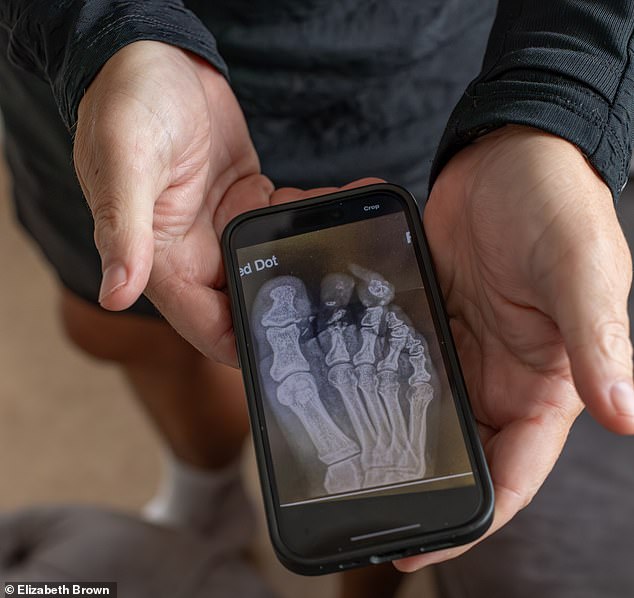Over half of all accidental deaths occur at home, with falls, poisonings and burns being the most common.
According to the Royal Society for the Prevention of Accidents, falls account for 40 per cent of domestic accidents, while accidental poisoning makes up 34 per cent.
Thankfully, most accidents at home won’t be too serious, but it pays to be cautious while carrying out any DIY or garden projects at home.
Brian Whitnall, 50, knows this better than most. He ended up in hospital for six days in September last year when he lost two of his toes after falling over when mowing his lawn.
Brian, who works as a sales manager for a printer and photocopier company, lives near Stansted in Essex with his partner, Rachel, 42, a personal assistant.

Accident at home: Brian Whitnall pictured with his partner, Rachel
He explains: ‘It was a warm Sunday and as I was walking with my Flymo lawnmower.
‘I stepped backwards and my foot caught on the stairs of my grandson’s trampoline.
‘Earlier, I’d spilt some water from a paddling pool onto that patch of grass. I’m not sure if my sliders slipped on that water and contributed to what happened, but the next thing I knew I was falling backwards.
‘Rather than letting go of the handle to turn off the engine, I grabbed it tighter to try and steady myself and brought the lawnmower towards me.’
Brian instantly knew something serious had happened.
‘I felt a searing heat in my right foot and knew straight away that I’d lopped off some toes’, Brian said.

Incident: Brian Whitnall lost two toes in an accident involving a lawn mower in September 2024
He added: ‘Rachel came running into the garden, she saw the blood and grabbed a tea-towel to staunch the flow from my foot and then retrieved the two severed toes and put them in a glass of ice.
‘An ambulance arrived, the paramedics gave me morphine, put me on a drip and within the hour I was in hospital. Sadly, two of my toes were gone forever. The blade also went right through to the bone on my big toe but that was saved.
‘I was in hospital for six days in order to be monitored and make sure the wound was not infected. After that, I had to wear a protective boot for several weeks.’
The accident also left Brian temporarily unable to work.
It is sensible to wear closed-toe sturdy shoes while mowing the lawn. Sliders or flip-flops aren’t up to the job.

Impact: An X-ray image showing the impact of the accident on Brian Whitnall’s foot
Adrian Simpson, head of policy at the RoSPA, said: ‘Brian’s story is just one example of the thousands of accidents that occur in homes across Britain every year.
‘Whilst we rally the Government to take on board the asks in our recent Safer Lives : Stronger Nation report, we advise anyone looking for tips on staying safe – be it in the home, at leisure or at work – to get to grips with our learning resources and advice that can be found online.’
Tips to avoid accidents at home
The RoSPA has a number of pointers to help people avoid common accidents while at home.
1. Help prevent falls
When working on DIY projects or gardening tasks that require reaching high places, ensure ladders and step stools are in good condition, and placed stable on level footing.
Avoid overreaching and always maintain three points of contact while using a ladder.
Keep walkways and stairs free of clutter, tools and garden equipment to avoid tripping. Regularly check for uneven surfaces and repair them promptly.
For outdoor steps and garden paths, the RoSPA recommends installing handrails to provide support and reduce the risk of falls.
2. Help prevent accidental poisoning
It sounds far-fetched, but accidental poisoning at home is common. People often have all sorts of cleaning products and gardening fertilisers or weeds killers at home.
Keep all gardening chemicals, pesticides, and cleaning products up high in a secure, locked cabinet, out of reach of children and pets. Take the time to label all containers.
Consider replacing toxic or corrosive substances with products that can do the same job, but are less harmful.
Read and follow the manufacturer’s instructions when using chemicals and pesticides. Always wear appropriate protective gear, such as gloves and masks, to avoid exposure.
Dispose of unused or expired chemicals according to local regulations to prevent accidental poisoning.
3. Using tools and electrical equipment
When working with power tools or performing DIY tasks, wear protective gear like safety goggles and gloves to prevent injuries from flying debris.
Regularly inspect garden tools and DIY equipment for damage or wear. Replace or repair faulty items to ensure they are safe to use.
Always use tools as intended and follow safety guidelines. For example, use long-handled tools for barbecues and avoid risky manoeuvres on trampolines.
Avoid using electrical equipment in wet conditions to prevent electrocution. Store tools and equipment in a dry place.
4. Smoke and fire risks
The RoSPA recommends placing barbecues on level ground, away from flammable materials. Never use accelerants like petrol or meths to light the barbecue. Ensure it is fully extinguished before disposal.
Keep a fire extinguisher or bucket of sand nearby when using fire pits or barbecues. Ensure smoke detectors are installed and functioning in your home.
5. Avoid dust and fumes
When sanding, painting or using chemicals, ensure the area you are in is well-ventilated. Use masks to protect against inhaling dust or fumes.
Store small DIY items like screws, nails and other hardware out of reach of children to prevent choking hazards.







